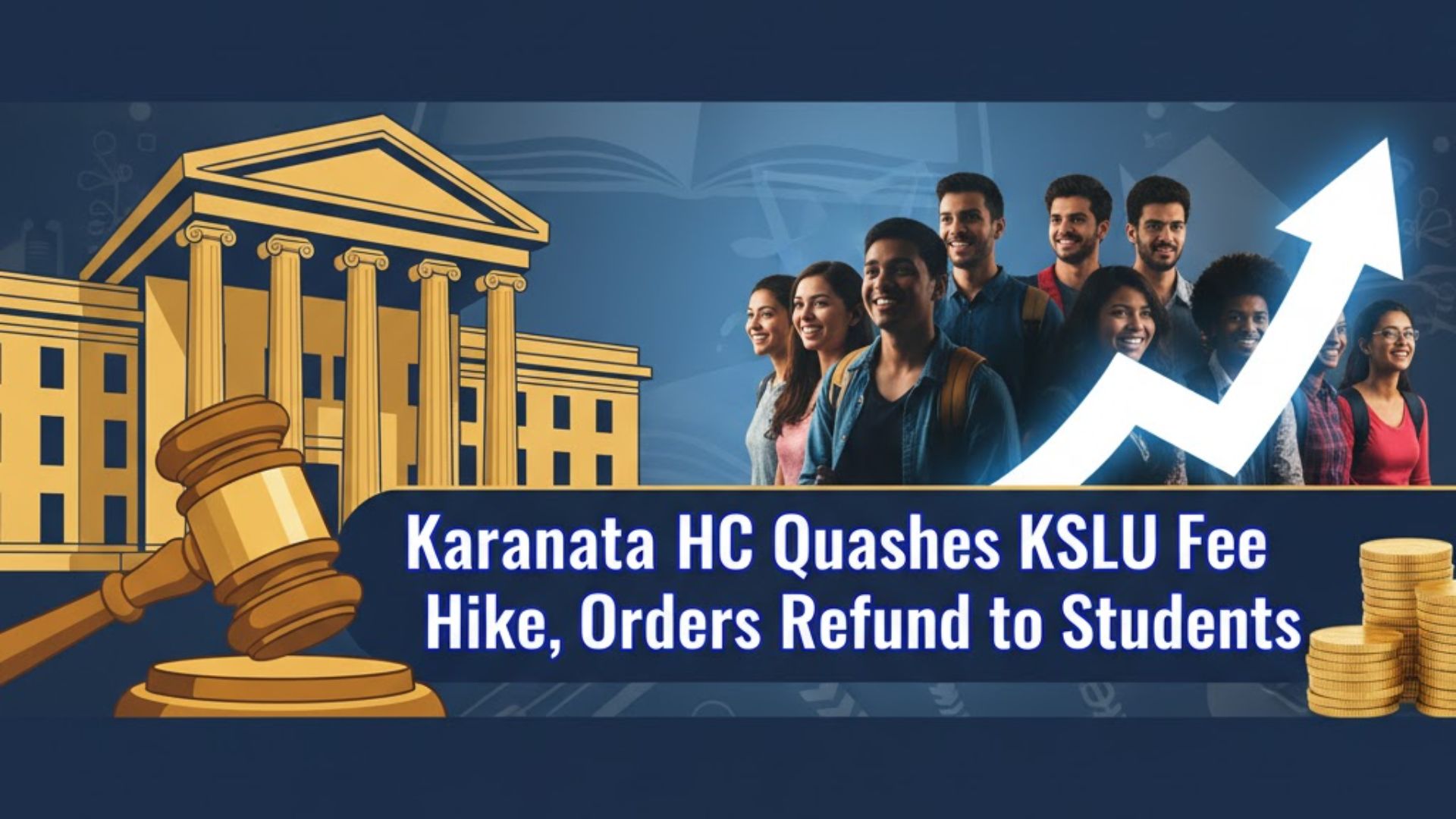
Karnataka High Court Quashes KSLU Fee Hike, Orders Refund to Students
Court Says University Cannot Increase Fees Without Proper Legal Backing
Thousands of Law Students Across Karnataka to Benefit from Ruling
By Our Legal Reporter
New Delhi: October 30, 2025: In a major relief to law students across Karnataka, the Karnataka High Court has quashed a circular issued by the Karnataka State Law University (KSLU) that had significantly increased student registration and admission fees for the academic year 2025–26. The Court, led by Justice R. Devdas, ruled that the University had no statutory authority to impose the hike and directed it to refund the excess fees collected within two months of receiving the certified order.
The judgment came in response to multiple petitions filed by students, including Pranava K.N. and others, who challenged the legality of the fee hike.
The Fee Hike Controversy
- Before the July 2, 2025, circular, KSLU charged ₹3,700 as registration and related fees.
- The new circular increased the amount to ₹8,580, more than doubling the fee burden on students.
- Students argued that the hike was arbitrary, lacked transparency, and had no legal basis under the Karnataka State Law University Act, 2009.
The petitioners pointed out that while Section 5 of the Act empowers the University to collect fees, such levies must be supported by statutes, regulations, or ordinances. Since no such framework existed, the hike was unlawful.
Court’s Observations
Justice Devdas made several important observations while delivering the ruling:
- No Statutory Backing: The University failed to show any statute or regulation authorizing the fee hike.
- Power vs. Procedure: While KSLU has the power to collect fees, it must follow due legal process. Arbitrary circulars cannot replace statutory rules.
- Refund Order: The Court directed KSLU to refund the excess fees collected from all students, not just the petitioners, within two months.
- Student Rights: The Court emphasized that students cannot be burdened with unlawful financial demands, especially when education is already expensive.
Impact on Students
The ruling is expected to benefit over 40,000 law students enrolled in colleges affiliated with KSLU across Karnataka. Many students had protested the sudden hike, arguing that it placed an unfair financial strain on families.
With the Court’s order:
- Students will receive refunds of the excess amount paid.
- Future fee revisions will require proper statutory backing.
- The judgment sets a precedent for other universities attempting arbitrary fee hikes.
Reactions to the Judgment
- Students: Celebrated the verdict as a victory for student rights and affordable education. Social media posts from law students hailed the decision as a “landmark judgment.”
- Legal Experts: Welcomed the ruling, noting that it reinforces the principle of rule of law in educational governance.
- University Officials: Have yet to issue a detailed statement but are expected to comply with the refund directive.
Wider Significance
This case highlights the growing tension between universities seeking to raise funds and students demanding accountability. The ruling underscores:
- Transparency in Education: Universities must justify fee structures through proper legal channels.
- Judicial Oversight: Courts can intervene when educational institutions act beyond their legal authority.
- Student Empowerment: The case shows how collective student action can bring about systemic change.
Similar Precedents
The Karnataka High Court’s decision aligns with earlier rulings in other states where courts have struck down arbitrary fee hikes:
- The Madras High Court has previously ruled against private colleges imposing unapproved fees.
- The Supreme Court of India has emphasized that education is not a commercial activity and must remain accessible.
Conclusion
The Karnataka High Court’s decision to quash the KSLU fee hike is a landmark victory for students and a reminder that universities must operate within the framework of law. By ordering refunds and insisting on statutory backing for future fee changes, the Court has reinforced the principle that education should remain fair, transparent, and affordable.
This ruling is likely to influence similar disputes across India, ensuring that students are not subjected to arbitrary financial demands.
ALSO READ POPULAR ARTICLES
-
Delhi HC: Cheque Bounce Cases Invalid Against Dissolved Firms
-
Supreme Court Raps NMC for Not Paying Medical Intern Stipends
-
Supreme Court Halts GST Assessment on Joint Development Deals
-
Supreme Court Explains Demurrer Law in Neelkanth Realty Case
-
Supreme Court Opens Door for Vodafone Idea Relief in AGR Case
-
Delhi High Court Rules No Alimony for Financially Independent Spouse
-
Akshay Kumar Moves NCLAT Against Edtech Firm Over ₹4.83 Cr Dispute
-
SC Quashes Chhattisgarh Tender Clause Favoring Local Bidders
-
SC to Examine Validity of Securities Transaction Tax on Trading
-
SC Defers Vodafone Idea ₹5,606 Crore AGR Dues Hearing to Oct 13
-
Punjab & Haryana HC: Bail Can’t Be Cancelled for Seeking Hearing Exemptions
-
Delhi HC Protects Mankind Pharma’s ‘Kind’ Trademark, Bars Similar Names
-
Delhi HC Appoints Justice Rajiv Shakdher as Arbitrator in Playboy Bar Dispute
-
Karisma Kapoor’s Kids Challenge Sunjay Kapur’s Will in Delhi HC
-
SC Questions Dual Madras HC Hearings, Reserves Verdict on TVK Plea
-
SC Lets Judicial Officers With 7 Years Bar Apply for District Judge
-
SC to Hear Vijay’s TVK Plea Against SIT Probe in Karur Stampede
-
SC Probes Financial Irregularities in Indiabulls Housing: ED
-
Delhi HC Quashes 22-Year-Old Case Against Lawyer Over Basement Office
-
SC Seeks Rehab Plan for Cadets Injured During Military Training
-
SC PIL Seeks CBI Probe, Nationwide Review on Cough Syrup Deaths
-
Delhi HC Hikes Land Compensation for Yamuna Project Villagers
-
Punjab & Haryana HC: Bail Can’t Be Denied Over No Permanent Home
-
SC: Appellate Courts Can Correct Trial Court Evidence Errors